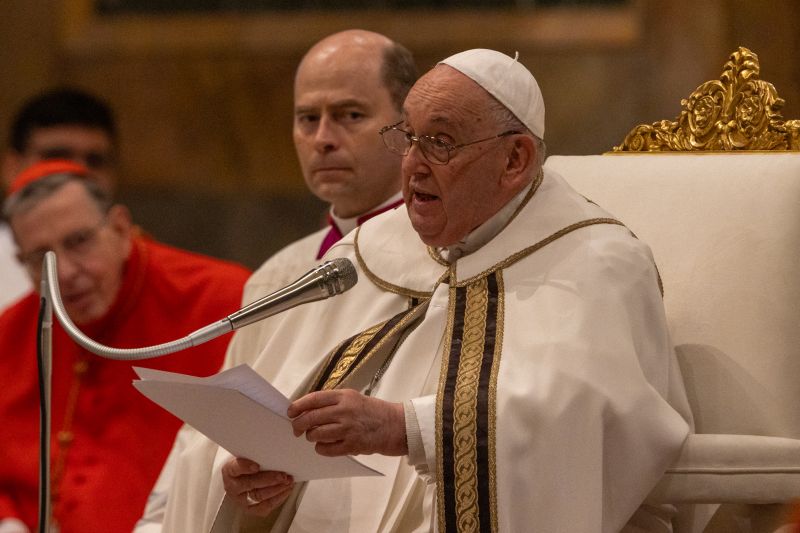Washington, D.C. Newsroom, Jan 25, 2024 / 16:00 pm (CNA).
Marking the conclusion of the Week of Prayer for Christian Unity, Pope Francis hosted an ecumenical solemn vespers at Rome’s Basilica of St. Paul Outside the Walls on Thursday.
In attendance at the vespers were Archbishop of Canterbury Justin Welby; Metropolitan Polycarp of Italy, representing the Ecumenical Patriarchate of Constantinople; and representatives from several other churches and ecumenical movements, as well as members of the Roman Curia and lay faithful.
Metropolitan Polycarp of Italy, representing the Ecumenical Patriarchate of Constantinople, and Cardinal Kurt Koch, prefect of the Vatican Dicastery for Promoting Christian Unity, participate in an ecumenical second vespers at the Basilica of St. Paul Outside the Walls in Rome on the feast of the Conversion of St. Paul, Jan. 25, 2024. Credit: Daniel Ibañez/CNA
About 2,500 faithful filled the Roman basilica for the solemn vespers for the solemnity of the conversion of St. Paul.
The vespers were livestreamed by EWTN; click here to watch the full vespers.
During the ceremony, Francis preached on the parable of the good Samaritan and the example of St. Paul in allowing God’s love to transform one’s will and to work toward Christian unity.
“The people who failed to do good, who proved callous, were the priest and the Levite, who were more concerned with respecting their religious traditions than with coming to the aid of a suffering person,” he said. “The one who demonstrates what it means to be a ‘neighbor’ is instead a heretic, a Samaritan. He draws near, he feels compassion, he bends down and gently tends to the wounds of that brother. He is concerned for him, regardless of his past and his failings, and he puts himself wholly at his service.”
Pope Francis and Archbishop of Canterbury Justin Welby exchange greetings with other Christian leaders at an ecumenical second vespers at the Basilica of St. Paul Outside the Walls in Rome on the feast of the Conversion of St. Paul, Jan. 25, 2024. Credit: Daniel Ibañez/CNA
“All efforts to attain full unity are called to follow the same route as Paul, decentralizing our own ideas in order to hear the Lord’s voice and give him the space to take the initiative,” the pope continued. “Only a love that becomes gratuitous service, only the love that Jesus taught and embodied, will bring separated Christians closer to one another. Only that love, which does not appeal to the past in order to remain aloof or to point a finger, only that love which in God’s name puts our brothers and sisters before the ironclad defense of our own religious structures, will unite us.”
“Each baptized person is a member of the one body of Christ; what is more, everyone in this world is my brother or my sister, and all together we compose that ‘symphony of humanity’ of which Christ is the firstborn and redeemer,” the pope added.
Francis called to mind the work of Paul Couturier, a priest and 20th-century ecumenical leader who was largely responsible for the establishment of the Week of Prayer for Christian Unity.
Pope Francis leads an ecumenical second vespers at the Basilica of St. Paul Outside the Walls in Rome on the feast of the Conversion of St. Paul, Jan. 25, 2024. Credit: Daniel Ibañez/CNA
Following Couturier’s example, the pope said that prayer must hold a preeminent place in efforts to restore unity to the Christian church.
The pope quoted the Second Vatican Council, saying: “The closer their union with the Father, the Word, and the Spirit, the more deeply and easily will they be able to grow in mutual love.”
“As we pray together,” he went on, “may we acknowledge, each of us starting with himself or herself, our need for conversion, for letting the Lord change our hearts. This is the path before us: journeying together and serving together, giving priority of place to prayer. For when Christians grow in the service of God and neighbor, they also grow in reciprocal understanding. Prayer for unity is the primary responsibility in our journey together.”
Pope Francis and other Christian leaders pray at the tomb of St. Paul during an ecumenical second vespers at the Basilica of St. Paul Outside the Walls in Rome on the feast of the Conversion of St. Paul, Jan. 25, 2024. Credit: Vatican Media
Welby also gave an address during the ceremony in which he said that “our hatreds, our anger imprisons us. Our rivalry, dislike of our brothers and sisters, cuts us off from the freedom that God offers his church. It is a freedom that can come at any time. All it takes is that we obey the Lord’s command to love one another, to wash each other’s feet.”
“The church of Christ is called to be free because it is in love with God, with each other, and receiving the gift of freedom is able to be a hospital, a hope, a place of healing for those who are suffering the sins of the world today,” he went on. “Let us on this feast of the conversion of St. Paul see that he was moved from chains of hatred to the energy and the love that comes with freedom.”
Archbishop of Canterbury Justin Welby meets with Pope Francis on Jan. 25, 2024, at the Vatican. Credit: Vatican Media
Vespers, also called evening prayer, is a part of the Liturgy of the Hours and consists of prayers, Scripture readings, and hymns.
Welby and many other leaders in the Church of England as well as ecumenical representatives from various other churches have been in Rome this week for “Growing Together,” a weeklong summit of ecumenical discussions coinciding with the Week of Prayer for Christian Unity, Jan. 18–25.




